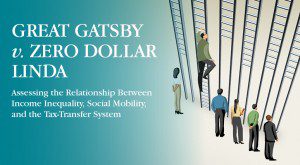Former Chief Statistician of Canada says many tax-transfer programs intended to address income inequality have been decreasing social mobility for low-income Canadians, often trapping them behind low income and welfare walls
April 9, 2015 – Income transfer programs are doing little to encourage social mobility and are in some cases trapping low-income Canadians behind low income and welfare walls, according to a new Macdonald-Laurier Institute report by former Chief Statistician of Canada Munir Sheikh.
In their attempts to address income inequality, he writes, governments should design policies that don’t inadvertently keep people from reaching their full economic potential.
“Despite decades of lip service to the idea of eliminating the welfare and low-income traps, they are still very much with us”, writes Sheikh. “Our social policies must, therefore, be reformed with an eye to eliminating this self-imposed but unconscionable and unnecessary barrier to social mobility”.
To read the full report, click here.
The problem, says Sheikh, is that many wealth transfer programs provide a disincentive for low-income people to move up the ladder.
For example, Ontario offers specialized benefits to those who are receiving social assistance but not to those working at low incomes.
“In Canada, many inappropriate tax-transfer policies have helped to condemn people to being trapped behind low-income and poverty walls and, rather than improving social mobility, may have worsened it”, writes Sheikh.
The report, titled “Great Gatsby v. Zero Dollar Linda: Assessing the relationship between income inequality, social mobility and the tax transfer system”, uses two different economic models to make the case.
Sheikh argues that the evidence suggests the so-called “Great Gatsby” model is insufficient for explaining the impact of reducing income inequality. That model suggests that using the tax-transfer system to reduce income inequality would also help increase social mobility.
But when one considers the “Zero Dollar Linda” model, there is evidence that the relationship between income inequality and social mobility is not so simple. Zero Dollar Linda refers to the famous case of a woman from Toronto who found it more beneficial to be unemployed and receiving government benefits than to have a part-time job that saw her benefits clawed back.
In analysing the two models, Sheikh finds that while there is evidence for a correlation between income inequality and social immobility. His research shows that in Canada, poverty and income inequality don’t always move together.
This suggests that tax-transfer programs are doing a poor job of fostering social mobility. Rather than helping low-income Canadians move out of poverty, these programs are providing incentives for people to rely on government benefits.
Sheikh says that doesn’t mean income redistribution programs can never help in increasing social mobility but that they must be carefully designed to avoid trapping people who wish to work.
“Beyond simple income redistribution, done appropriately, policy should be directed at improving the ability of low-income people to acquire useful skills and to be available for work”, writes Sheikh.
***
Munir Sheikh is the former Chief Statistician of Canada and an Executive Fellow at the School of Public Policy at the University of Calgary. He also served as a co-Commissioner of Ontario’s Social Assistance Review, which submitted its report to the Government of Ontario on transforming the program in October 2012.
The Macdonald-Laurier Institute is the only non-partisan, independent national public policy think tank in Ottawa focusing on the full range of issues that fall under the jurisdiction of the federal government. Join us in 2015 as we celebrate our 5th anniversary.
For more information, please contact Mark Brownlee, communications manager, at 613-482-8327 x105 or email at mark.brownlee@macdonaldlaurier.ca.





